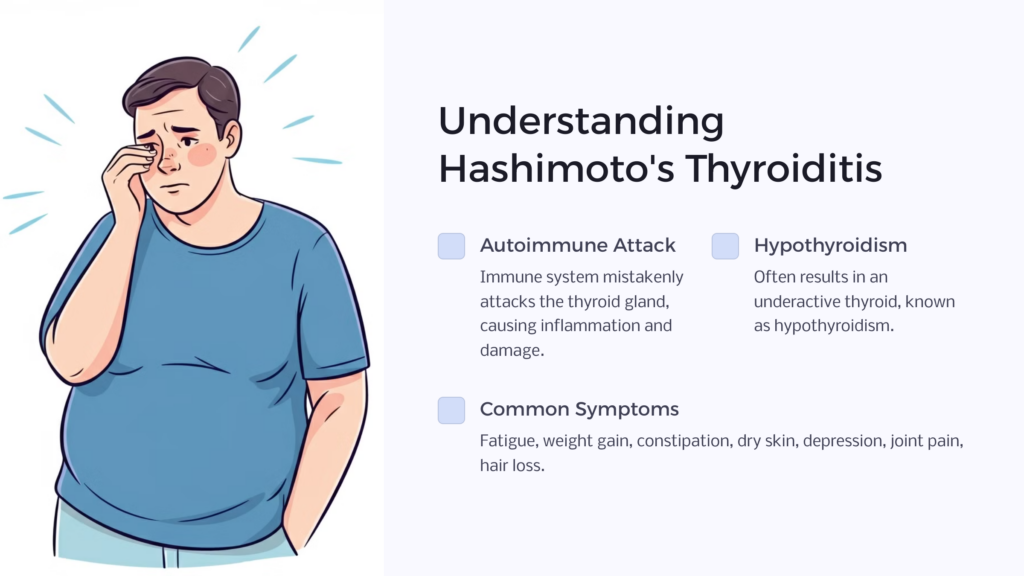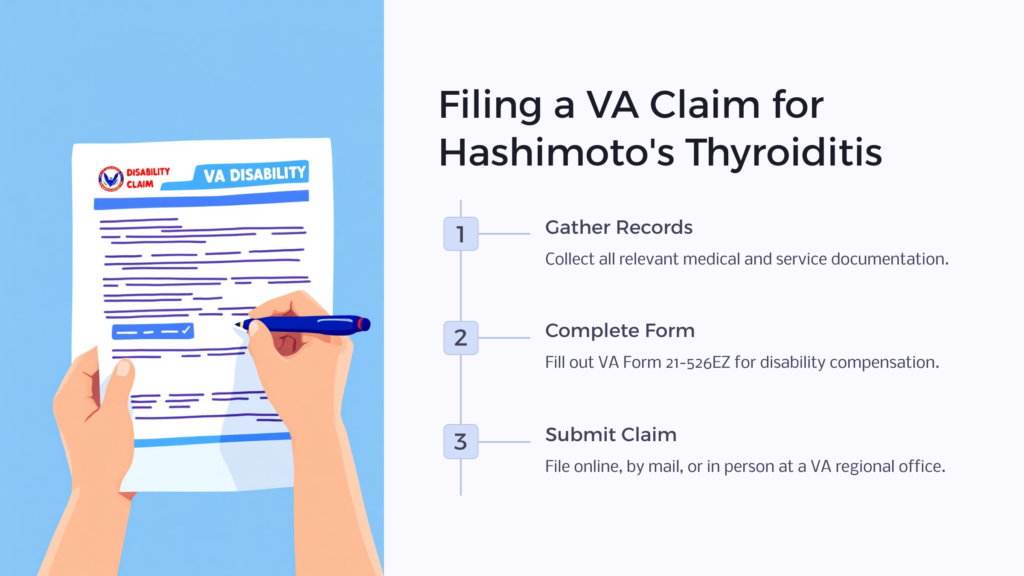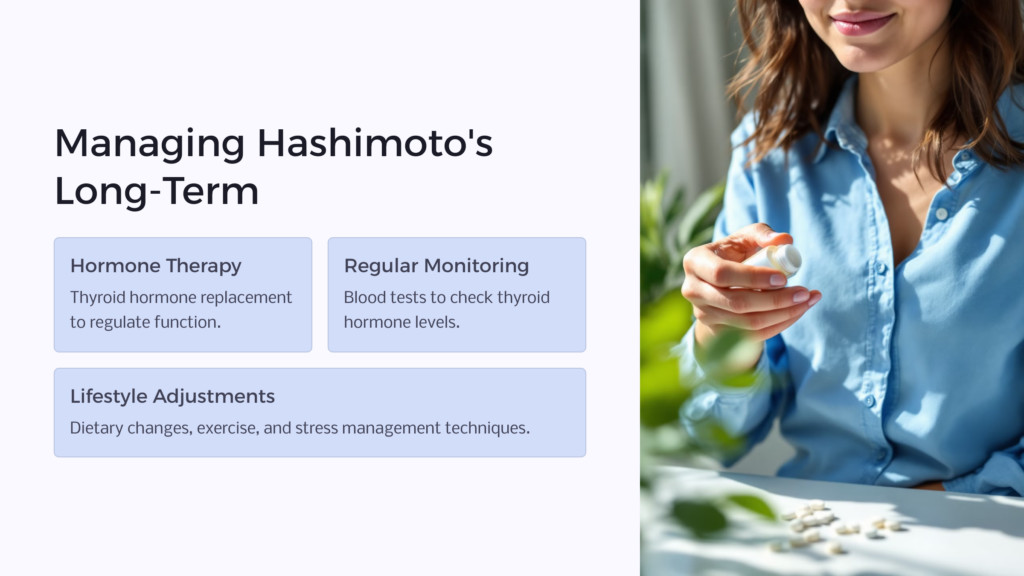Hashimoto’s thyroiditis is an autoimmune disorder that affects the thyroid gland. For veterans, this condition can have a significant impact on their health and daily life. The Department of Veterans Affairs (VA) provides disability compensation for service-connected thyroid conditions, including Hashimoto’s thyroiditis. In this article, we’ll explore how the VA rates this condition and what veterans need to know to get the benefits they deserve.

What is Hashimoto’s Thyroiditis?
Hashimoto’s thyroiditis occurs when the immune system mistakenly attacks the thyroid gland. This attack can lead to inflammation and damage, often resulting in an underactive thyroid, known as hypothyroidism. The condition is named after Dr. Hakaru Hashimoto, who first described it in 1912.
Common symptoms of Hashimoto’s thyroiditis include:
- Fatigue
- Weight gain
- Constipation
- Dry skin
- Depression
- Joint or muscle pain
- Hair loss
These symptoms can vary in severity and may develop slowly over time, making the condition challenging to diagnose without proper medical attention.
VA Disability Ratings for Thyroid Conditions
The VA rates thyroid conditions, including Hashimoto’s thyroiditis, under the Schedule of Ratings for the Endocrine System. Specifically, it falls under Diagnostic Code 7903 for hypothyroidism. The ratings range from 0% to 100%, depending on the severity of symptoms and their impact on daily functioning.
Here’s a breakdown of the VA rating scale for hypothyroidism:
- 100%: Cold intolerance, muscular weakness, cardiovascular involvement, mental disturbance, bradycardia (less than 60 beats per minute), sleepiness
- 60%: Muscular weakness, mental disturbance, and weight gain
- 30%: Fatigability, constipation, and mental sluggishness
- 10%: Fatigability, or; continuous medication required for control
It’s important to note that these ratings are based on the symptoms present and their severity, not just the diagnosis itself.
Connecting Hashimoto’s Thyroiditis to Military Service
To receive VA disability compensation for Hashimoto’s thyroiditis, veterans must establish a service connection. This means proving that the condition either began during or was aggravated by military service. There are several ways to establish this connection:
- Direct Service Connection: The condition started while on active duty.
- Presumptive Service Connection: The condition developed within one year of discharge from active service.
- Secondary Service Connection: The condition developed as a result of another service-connected disability.
Veterans should gather medical records, service records, and any other relevant documentation to support their claim for service connection.
Filing a Claim for Hashimoto’s Thyroiditis

To file a claim for Hashimoto’s thyroiditis, veterans can follow these steps:
- Gather all relevant medical records and service documentation.
- Complete VA Form 21-526EZ, Application for Disability Compensation and Related Compensation Benefits.
- Submit the form and supporting documents to the VA, either online through the VA.gov website, by mail, or in person at a VA regional office.
It’s crucial to provide as much detailed information as possible about the condition, its symptoms, and how it affects daily life. This information helps the VA accurately assess the severity of the condition and assign an appropriate disability rating.
Providing Medical Evidence for Your Claim

Strong medical evidence is key to a successful VA disability claim for Hashimoto’s thyroiditis. This evidence should include:
- Diagnosis from a qualified medical professional
- Medical records showing ongoing treatment
- Lab results, including thyroid function tests
- Statements from the veteran describing symptoms and their impact on daily activities
- Buddy statements from family, friends, or fellow service members who can attest to the veteran’s symptoms
The more comprehensive and detailed the medical evidence, the better chance veterans have of receiving an accurate disability rating.
Challenging a VA Rating Decision
If a veteran disagrees with the VA’s rating decision for their Hashimoto’s thyroiditis claim, they have the right to appeal. The appeals process includes several options:
- Supplemental Claim: Submit new and relevant evidence to support the claim.
- Higher-Level Review: Request a review by a senior VA employee.
- Board Appeal: Appeal directly to the Board of Veterans’ Appeals.
Each option has specific requirements and deadlines, so it’s important for veterans to carefully consider their choices and seek assistance if needed.
Managing Hashimoto’s Thyroiditis Long-Term

While seeking appropriate VA compensation is important, managing the condition itself is crucial for long-term health. Treatment typically involves thyroid hormone replacement therapy to regulate thyroid function. Regular monitoring and adjustments to medication may be necessary.
Veterans should work closely with their healthcare providers to manage symptoms and maintain overall health. This may include:
- Regular blood tests to check thyroid hormone levels
- Dietary adjustments to support thyroid function
- Exercise and stress management techniques
- Monitoring for potential complications or related conditions
By actively managing their condition, veterans can improve their quality of life and potentially prevent further health complications.
Resources for Veterans with Hashimoto’s Thyroiditis
Several resources are available to help veterans navigate the VA claims process and manage their Hashimoto’s thyroiditis:
- VA.gov website: Provides information on filing claims and accessing VA healthcare
- Veterans Service Organizations (VSOs): Offer free assistance with VA claims and appeals
- VA Medical Centers: Provide specialized care for thyroid conditions
- Support groups: Connect with other veterans dealing with similar health challenges
Veterans should take advantage of these resources to ensure they receive the care and benefits they’ve earned through their service.
Find The Benefits You Deserve
Hashimoto’s thyroiditis can significantly impact a veteran’s life, but with proper understanding of the VA rating system and available resources, veterans can access the care and compensation they need. By gathering strong medical evidence, clearly documenting symptoms, and working closely with healthcare providers, veterans can build a solid case for their VA disability claim.
Remember, the journey to managing Hashimoto’s thyroiditis and navigating the VA system may be challenging, but you’re not alone. Seek support, stay informed, and advocate for your health and benefits. With persistence and the right resources, veterans can achieve the recognition and support they deserve for their service-connected thyroid condition. Start today by taking our quiz at Benefits.com!
 Benefits.com Advisors
Benefits.com Advisors
With expertise spanning local, state, and federal benefit programs, our team is dedicated to guiding individuals towards the perfect program tailored to their unique circumstances.
Rise to the top with Peak Benefits!
Join our Peak Benefits Newsletter for the latest news, resources, and offers on all things government benefits.




















